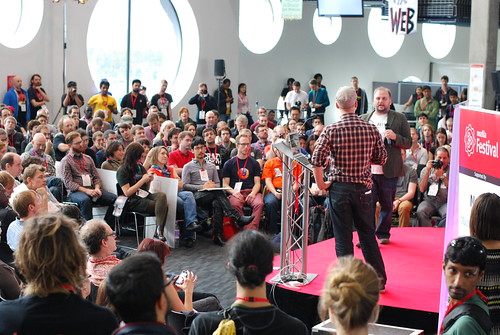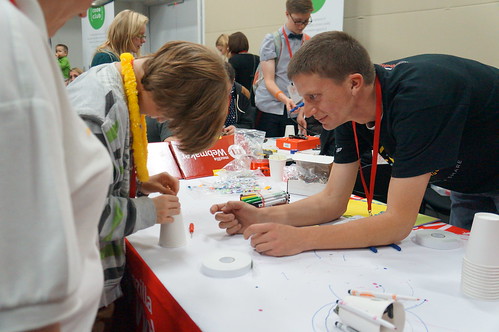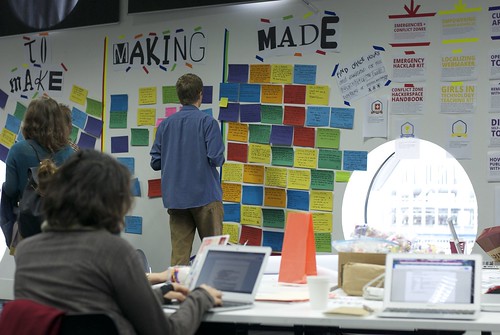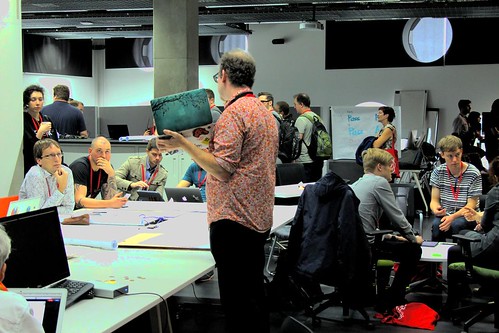Last weekend nearly 1,500 web experts, journalists, artists, educators and hackers came together for our fourth annual MozFest — our biggest yet. Participants spent an amazing three days brainstorming and building the future of the web, and hacking topics like online privacy, access, education and mobile technology. The festival centered around a “less yack, more hack” ethos, encouraging both experts and novices from wildly divergent fields to bring their ideas to the table and spend the weekend building prototypes.

Every year MozFest has a focus, and this year centered around Mozilla’s commitment to creating a web-literate world — whether that means teaching basic coding skills, spreading an understanding of privacy and security, or integrating the open web into non-traditional fields such as journalism and scientific research.
As a part of that commitment, we showcased our Webmaker project, which has unveiled a number of new features and functionality, including integration of Together.js to better facilitate remote teaching, hackable profiles, remixable teaching kits, and a Web Literacy Standard — a map designed by our community of the skills and competencies for teaching the web and what it means to be web literate.
Webmaker also showcased a vibrant volunteer community that is already teaching the web around the world — including more than 50,000 people who joined 1,600 events in 330 cities at our global Maker Party — teaching vital web skills to people their own communities.

We also heard from some great speakers, like entrepreneur Anil Dash, privacy expert Camille François, and associate Digital Editor for the New York Times, Aron Pilhofer; as well as the Guardian’s James Ball and ProPublica’s Jeff Larson.
Interactive sessions at MozFest covered areas such as web literacy and education, robotics and circuitry, open gaming, privacy and online data, tech and the future of journalism and open technology.

The festival closed with a demo party on Sunday night, where participants showcased the incredible projects and prototypes they’d built over the weekend, including:
- Emergency Hacklab: webmaking for emergencies and low-fi environments.
- A draft teaching kit on how to use Lightbeam in a workshop setting.
- Disconnect: a database of invisible mobile trackers: a project that helped people perform a man-in-the-middle attack on their own mobile phones.
- Interpret, Troubleshoot and Tag Spectral Data: a project that helped users interpret, troubleshoot, and tag data collected using open source spectrometers.
- Text Gender Analysis API: a simple web API for finding out about the gender of who’s writing, written about and mentioned in text.
- Pass the App: a simple tool to allow anyone to build an app to raise money for their favourite cause.
- KettleCorn: a project that introduced new features in Mozilla’s open source multimedia tool Popcorn specifically for journalists.
- The Command Line Murders: a mystery-style game designed to help journalists navigate data-dumps like the NSA PRISM files.

“MozFest is where many of Mozilla’s best and most innovative ideas have sprung to life. This year’s event has certainly given us plenty of food for thought and will help in our work to ensure the web remains a resource open to everyone.” — Mark Surman, Executive Director of Mozilla
Get Involved:
- Read about the latest version of Webmaker
- Learn more about the Web Literacy Standard
- Check out some of the festival highlights on the MozFest blog
- Read about what we made together at MozFest
- See all of the festival sessions, and notes from sessions, on the schedule
- Watch the keynote presentations and project announcements on Air Mozilla
- Check out a few of the great MozFest moments on our Tumblr
- Scroll through some of our favourite MozFest photos